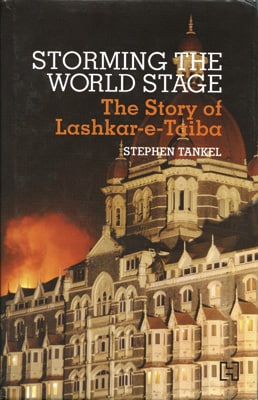Book Review: Storming the World Stage
Stephen Tankel's book provides one of the most detailed accounts of Lashkar-e-Taiba


The hook for the book is the 2008 Mumbai terror attacks when 10 trained LeT fighters wreaked havoc in South Mumbai. That was the turning point for LeT when it announced to the world that it had ‘arrived’. It was groomed by the Pakistani army and Pakistan’s premier intelligence agency, Inter-Services Intelligence (ISI), since the 1990s to be the country’s most powerful weapon in its proxy war against India.
Tankel’s analysis of the good and bad jihadis makes for particularly interesting reading as he illustrates how the Pakistani government under Pervez Musharraf divided Pakistan’s militants into what they perceived as good and bad groups. Groups that followed the ISI line were good and LeT became Pakistan’s blue-eyed boy.
And with the ISI behind it, LeT became a sort of mentor/venture capitalist in the war against India. LeT was funded by Muslim members of organised Indian crime, the most notorious one being Dawood Ibrahim who fled to Karachi after the Mumbai bomb blasts in 1993. Criminals still in India connected indigenous militants to LeT. “A terrorist network that became known as the Indian Mujahideen became the primary, though by no means the only, vehicle through which Lashkar escalated its involvement in terrorist attacks in India.” Other organisations that benefited because of LeT include the Students Islamic Movement of India (SIMI), the Kashmir Resistance Force and the United Jihad Council.
Another thread that Tankel explores in the same chapter is the relationship between al-Qaeda and LeT. Both groups were wary of associating with each other. LeT because al-Qaeda was the focus of the USA and the world after the 9/11 attacks and the Pakistani government was helping the US in hunting its members down al-Qaeda because LeT was close to the ISI. But there was no friction from LeT’s side when it came to helping al-Qaeda operatives escape the clutches of the ISI and the US. When al-Qaeda lost its Afghan sanctuary in the aftermath of the attacks, many of its members fled across the border along with other Arab jihadis and the Taliban. LeT had the best network in Pakistan and it made full use of it to help the refugees by providing safe haven, passports and forged documents.
The LeT runs a veritable empire with schools, training centres and mosques, says Tankel. Its aim: Islamic rule in the subcontinent, destruction of Hindu India and bringing down the US and Israel. Can the Pakistani government stop it? Maybe. Does it want to? No.
Storming the World Stage (The Story of Lashkar-e-Taiba)
Author: Stephen Tankel
Publisher: Hachette India
Pages: 352
Price: Rs. 550
First Published: Feb 10, 2012, 06:00
Subscribe Now